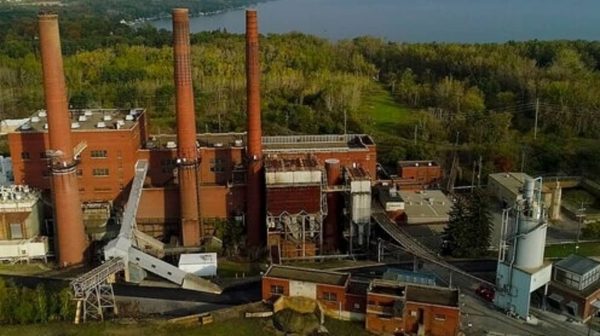
Mining large amounts of bitcoin at large scale requires cheap energy to run the vast computer arrays that are required to create and transact crypto currency.
Greenidge Generation produces 44 megawatts to run 15,300 servers plus to supply additional power into the state’s grid from a once-mothballed plant near Seneca Lake in the Finger Lakes region.
The megawatts dedicated to Bitcoin might be enough electricity to power more than 35,000 homes.
Proponents call it a competitive way to mine increasingly popular cryptocurrencies, without putting a drain on the existing power grid.
Environmentalists see the plant as a climate threat.
They fear a wave of resurrected fossil-fuel plants pumping out greenhouse gasses more for private profit than public good. Seeing Greenidge as a test case, they are asking the state to deny renewal of the plant’s air quality permit and put the brakes on similar projects.
“The current state of our climate demands action on cryptocurrency mining,” said Liz Moran of Earthjustice. “We are jeopardising the state’s abilities to meet our climate goals, and we set the stage for the rest of the country as a result.”
The former coal plant, in a touristy region known for its glacial lakes and riesling wines, was converted to natural gas by Greenidge and began producing electricity in 2017. Bitcoin mining at the plant, which has a 106-megawatt capacity, started in earnest last year. The company said it was “bringing a piece of the world’s digital future” to upstate New York.
“For decades, this region has been told it would see new industries and opportunities,” Greenidge said in a prepared statement. “We are actually making it happen, and doing it fully within the state’s nation-leading high environmental standards.”
A bitcoin miner unlocks bitcoins by solving unique, complex puzzles. As the value of Bitcoin goes up, the puzzles become increasingly more difficult, and it requires more computer power to solve them. Estimates on how much energy Bitcoin uses vary.
Greenidge said it mined 729 bitcoins over three months ending Sept. 30. The value of cryptocurrency fluctuates, and on Friday, one bitcoin was worth over USD 59,000.
Plant opponents suspect Greenidge of pulling a bait-and-switch, applying to run a power plant but planning to run a mining operation that is taking up more of the plant’s power.
Greenidge says mining was not part of the plan when the plant came back online and note they continue to provide power to the grid. From January through June, Greenidge said it used 58 per cent of its power for mining.
Supporters see it as an economic boon in a part of upstate New York that could use the help. Douglas Paddock, chairman of the Yates County Legislature, testified at a public hearing this week that the plant has brought 45 high-paying jobs and made a “significant contribution” to the area through tax payments and capital investments.
The potential effects of the plant’s water withdrawals from Seneca Lake are one of the reasons for some opposition to the plant. But air quality issues have taken center stage as the state Department of Environmental Conservation reviews the plant’s air emission permits.
Greenidge has said it’s in compliance with its permits and that the plant is 100 per cent carbon neutral, thanks to the purchase of carbon offsets, such as forestry programs and projects that capture methane from landfills.
Opponents claim the plant undercuts the state’s efforts to dramatically slash greenhouse gas emissions in the coming decades under its 2019 climate law.
A large coalition of environmental groups and other organisations this week asked Gov. Kathy Hochul to deny the air permit for Greenidge and to take a similar action to keep an existing plant near Buffalo from becoming a mining site.
The coalition wants Hochul to set a “national precedent” and enact a statewide moratorium on the energy intensive “proof-of-work” cryptocurrency used by bitcoin miners.
Environmentalists estimate that there are 30 plants in New York that could be converted into mining operations.
“I really think more than anything, this plant is a significant test for whether the state’s climate law is really worth anything,” said Judith Enck, who served as the EPA’s regional northeastern U.S. administrator under President Barack Obama.
Sens. Chuck Schumer and Kirsten Gillibrand have separately asked the federal Environmental Protection Agency to exercise oversight.
Around the country, there are other power plants being used for cryptocurrency mining under different types of arrangements.
In Venango County, Pennsylvania, a generation plant that converts coal waste into power is being used to mine bitcoins and can provide electricity to the grid when needed.
Stronghold Digital Mining has plans to replicate that kind operation at two other sites in Pennsylvania.
And in Montana, a coal-fired generating station is now providing 100 per cent of its energy to Marathon Digital Holdings for bitcoin mining under a power purchase agreement.
“We had previously done what many miners do, which is you find an industrial building, set it up for mining and then you contract for power from the grid,” Marathon CEO Fred Thiel said.
“And we wanted to flip that model upside down because we knew that there are lots of underutilised energy generation sources in the U.S.”
Thiel said that harmful emissions are low because of the quality of the coal and pollution controls, and that the plant would be carbon offset by the end of next year.
He said his company is focused on moving toward renewable energy, saying cryptocurrency miners can provide crucial financial incentives to build more clean energy projects.
New York state has yet to make a determination on Greenidge’s permits.
Greenidge said that even if the plant ran at full capacity, its potential emissions equate to 0.23 per cent of the state’s greenhouse gas emissions reduction target for 2030.
However, state Environmental Commissioner Basil Seggos tweeted last month that “Greenidge has not shown compliance with NY’s climate law” based on goals in that law.
“New York state is leading on climate change,” Seggos said in a prepared statement, “and we have some major concerns about the role cryptocurrency mining may play in generating additional greenhouse gas emissions.”




